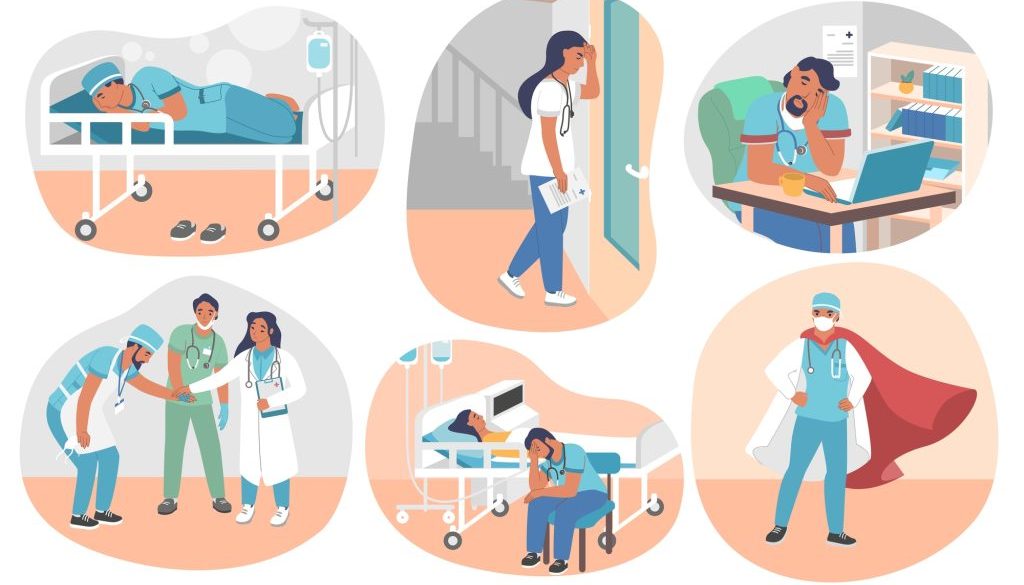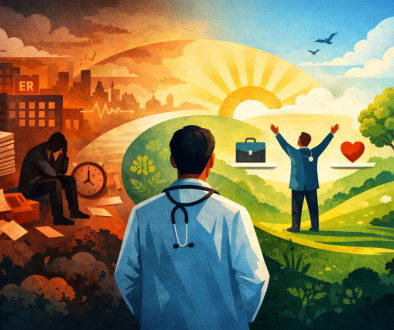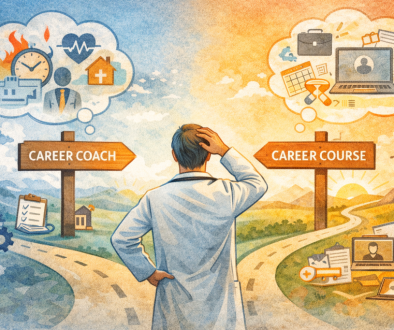Combating Burnout: A Physician’s Story
I didn’t know I was burned out. Unfortunately, I didn’t even realize I wasn’t OK. Looking back, it was obvious. First, I wasn’t sleeping. Second, when I walked to work, I fantasized about disappearing. I thought, “If I keep walking, how long will it take for someone to notice that I didn’t show up to work.” Finally, I wasn’t very nice. I was snippy, cynical, and impatient. After an incredibly long day that ended with a public outburst, a trusted colleague pulled me aside and asked me how I was feeling. I shrugged off the offer for help.
A few days later, I arranged and attended a coping session to debrief a recent challenging patient case. I put together the session for our trainees. During the session, a facilitator said, ” It is normal to feel challenged and stressed at times. If you aren’t sleeping, your personality has changed, and you can’t remember the last time you felt joy—that is not stress. You need help.” For whatever reason, that was my wake-up call. I was burned out and needed help.
Physician Burnout vs. Stress
Medicine is challenging. Stress is expected in challenging situations. I kept telling myself that I knew what I was getting into when I went to medical school. I wasn’t doing enought. Work harder and things would improve. Things did not improve. Stress is a normal response to a challenging situation. Stress allows us to perform at our best. Burnout is not stress. It is not normal.
Burnout is a state of chronic energy depletion that profoundly affects physicians, leading to emotional exhaustion, cynicism, feelings of ineffectiveness, and physical exhaustion. This pervasive issue impacts nearly half of medical students, residents, and practicing physicians. The incidence of burnout varies by specialty, with 62% of emergency medicine, 59% of hospital medicine, 58% of family medicine, and 55% of pediatric doctors reporting burnout symptoms. Despite the complexities of the healthcare system that contribute to burnout, several individual actions are effective at combating burnout.
Burnout: A Systemic Issue with Individual Impact
Burnout is a pervasive issue rooted in systemic factors within healthcare. The complex interplay of administrative burdens, electronic health record (EHR) demands, long work hours, and high patient loads contribute significantly to this problem. These systemic pressures, coupled with a culture that often prioritizes productivity over well-being, create an environment where physicians struggle with work-life balance and find fulfillment in their careers. The individual impact of burnout can be severe, leading to decreased job satisfaction, reduced quality of patient care, and even mental health issues for healthcare providers.
The impacts of burnout can be categorized into physical, emotional, and spiritual dimensions:
- Physical impacts: Burnout can manifest physically through fatigue, sleep disturbances, increased illness, and a higher risk of motor vehicle crashes.
- Emotional impacts: Emotionally, burnout often leads to anxiety, depression, irritability, and detachment from patients and family. Women physicians tend to experience higher rates of emotional exhaustion, while male physicians more commonly report detachment.
- Spiritual impacts: Spiritually, burnout can result in a loss of meaning in work, cynicism, and a diminished sense of personal accomplishment. This can lead to questioning one’s purpose and values as a physician.
Combating burnout with personal changes.
While acknowledging that true resolution requires systemic change, physicians can take steps to mitigate burnout. Individual choices and actions can make a difference and improve physician well-being. However, it’s crucial to recognize that these individual actions, while beneficial, are not a substitute for the necessary overhaul of healthcare systems and policies that perpetuate burnout. Blaming the person suffering from burnout for the problem is not the right solution. That said, the complexity of the healthcare landscape demands a multifaceted approach to address this critical issue effectively.
Physicians can protect themselves from systemic burnout by intentionally engaging in activities that replenish the lost physical, emotional, and spiritual energy.
-
Physical energy replenishment:
Regular exercise routines
Prioritizing adequate sleep
Maintaining a balanced, nutritious diet -
Emotional energy replenishment:
Practicing mindfulness or meditation
Engaging in hobbies or creative pursuits
Seeking support from peers or professional counseling -
Spiritual energy replenishment:
Reflecting on personal values and purpose in medicine
Engaging in community service or volunteer work
Practicing gratitude and focusing on meaningful patient interactions
Finding My Path Forward
Recognizing my own burnout was a turning point in my life. It was a wake-up call that prompted me to take action and prioritize my well-being. The first step I took was to find help. I partnered with a coach who understood my. Next, I acknowledged that I needed more margin in my life. I decreased my full-time equivalent (FTE) at work, allowing myself more time to focus on self-care and personal growth.
One of the most therapeutic activities I discovered during this time was gardening. Tending to plants, nurturing them, and watching them grow brought me a sense of peace and fulfillment. It served as a reminder that growth takes time and patience, a lesson I needed to apply to my own life. The fact that I liked getting my hands dirty and digging holes was a bonus.
Next, I made a conscious effort to reinvest in my relationships. I reached out to friends and family members, strengthening the connections that had been neglected during my burnout. Surrounding myself with supportive and understanding individuals was crucial in my recovery process.
Recognizing the need for personal development, I sought the guidance of a coach. Through their expertise, I learned valuable skills such as emotional intelligence (EIQ), effective communication, and leadership. These skills not only helped me in my professional life but also contributed to my overall well-being and personal growth.
Recovering from burnout was not an overnight process. It required dedication, self-reflection, and a willingness to make changes in my life. By recognizing the need for more margin, engaging in fulfilling activities like gardening, nurturing relationships, and investing in personal development, I gradually rebuilt my resilience and rediscovered my passion for medicine.
The Value of Physician Coaching
To my fellow physicians who may be experiencing burnout, I encourage you to take that first step towards recovery. Acknowledge your struggles, seek support, and prioritize your well-being. It is possible to find a path forward in the dysfunctional healthcare system. You simply need to look within to find it.
Remember that you are not alone in this journey, and that there is hope for a brighter future. By taking care of ourselves, we can better serve our patients and find renewed purpose in our noble profession.
The Developing Doctor offers programs specifically designed for physicians. Contact me to learn more or schedule a free coaching consult!





